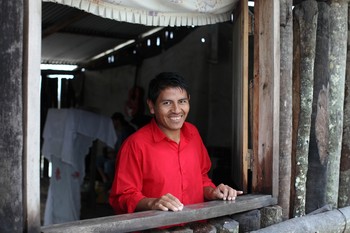Anibal Flores is standing barefoot in a tiny church, strumming a guitar. Outside, children play, sliding through puddles — the product of rains that flooded what was meant to be only a temporary home.
This is Yakye Axa, a camp in Paraguay with houses made of logs and plastic lining and a church that is also a primary school and a meeting room. It is the resistance of 67 indigenous families who for 20 years have lived here demanding the return of their ancestral territory.
Earlier this year, they finally won their battle and recovered more than 27,000 acres of land from the government. Now they are waiting for a road to be built so they can move and begin to build a new life.
“We have lived through fear, desperation, hopelessness, and exhaustion,” says Flores, one of the camp’s leaders. “Unable to work and without land to cultivate to produce food, we have sacrificed our health and that of our children. Some people have died. But we never gave up, and now we have won.”
The resilience and determination of Flores and his community can be seen across the South American Chaco, which is today the second-largest forest remaining in South America (after the Amazon). His story, written by Fionuala Cregan, a young professional working as program officer for the Gran Chaco in a joint program of Church World Service and the Regional Ecumenical Advisory and Service Center (CREAS), inspires and calls us to be protagonists in showing these signs of hope.
For more stories like this, order your 2014 Presbyterian Mission Yearbook for Prayer & Study today. Order through the Church Store or call 800-524-2612.

